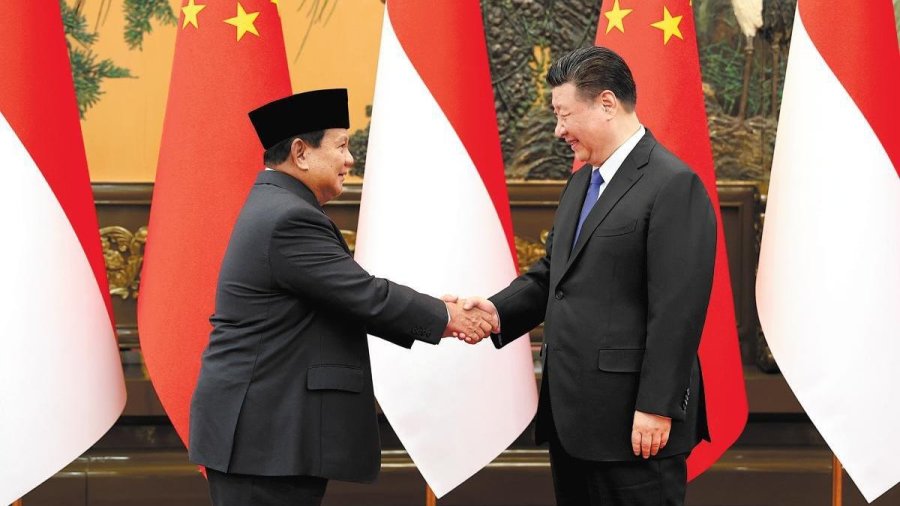Table of Contents
Indonesia and China Forge Joint Development Plan Amid Tensions in South China Sea
JAKARTA – Indonesia has reaffirmed its commitment to maintaining “good neighborliness” through a new joint development initiative with China, both in light of President Prabowo Subianto’s advocacy for peaceful partnerships and ongoing concerns over territorial claims in the South China Sea. The Indonesian Foreign Ministry clarified that the country will not compromise its legal rights or jurisdiction within its waters, following an agreement to pursue collaborative efforts in areas of overlapping claims with China.
Emphasizing Cooperation
The statement, released on Sunday, comes after President Prabowo’s initial meeting with Chinese President Xi Jinping on November 9, where both nations announced a mutual understanding to embark on joint development projects. This initiative has raised significant concerns among analysts and legal experts in Indonesia, who fear it may signal a departure from Jakarta’s traditional non-claimant stance and could jeopardize sovereign resource rights.
The director-general for Asia, Pacific, and Africa affairs at the Indonesian Foreign Ministry, Abdul Kadir Jailani, addressed these concerns while speaking from Peru. He emphasized, “The document outlines that the two parties will establish an intergovernmental committee to explore the cooperation and its modalities.” He reassured the public that the geographic scope for such initiatives would be determined by the committee in due course, though a specific timeline for its establishment has yet to be provided.
Tensions in the North Natuna Sea
Notably, the joint development announcement follows recent incidents in the North Natuna Sea, where a Chinese coast guard ship disrupted scientific surveys conducted by Indonesia’s state oil and gas company, Pertamina. The North Natuna Sea is rich in natural gas reserves and fisheries but has become a focal point for Indonesia amid increasing incursions by Chinese fishing vessels and grey hull ships claiming “traditional” fishing grounds.
China’s claims were previously rejected by an arbitral court ruling in 2016, which clarified their lack of basis under international law, particularly the 1982 United Nations Convention on the Law of the Sea (UNCLOS). Kadir highlighted that any acknowledgment of overlapping claims could undermine UNCLOS, stating, “This partnership is made in the spirit of the 2002 Declaration of Conduct in the South China Sea, which focuses on cooperation in the absence of border agreements.”
Concerns Among Experts
Despite the Indonesian government’s assurances, international law experts urge caution. I Made Andi Arsana, a researcher from Gadjah Mada University specializing in maritime boundary delimitation, expressed that even protective clauses may not prevent the reputational damage of recognizing overlapping claims with China. “This newfound acknowledgment may erode Indonesia’s reputation as a regional leader and mediator, undermining its diplomatic standing in ASEAN and beyond,” he warned.
Further complicating the situation, Andi advised that Indonesia needs to collect detailed data on the economic potential of contested areas before proceeding with any initiatives. Properly identifying overlapping claims would assist Indonesia in prioritizing and effectively allocating resources for joint development.
Calls for Stronger Action
Amid ongoing tensions, some figures within Indonesia are advocating for a more assertive stance. Andreas Salim, program director for maritime security at the Indonesia Ocean Justice Initiative (IOJI), has suggested that President Prabowo take cues from Philippines President Ferdinand Marcos Jr. in retracting any perceived ambiguities in agreements with China. “Now is the best time to push for the removal of the ‘overlapping claim’ phrase,” he asserted, particularly as it currently exists in a non-binding document.
Balancing Global Interests
These developments occur in the wake of Prabowo’s significant visits to both China and the United States, two global powers vying for influence in Southeast Asia. During his time in Washington, the Indonesian President reiterated the country’s commitment to respecting the interests of all nations while asserting its sovereignty. The joint statement issued with the U.S. emphasized the need for effective implementation of the DoC, highlighting a mutual interest in developing a Code of Conduct in the South China Sea that respects the rights and interests of third parties.
Despite mixed reactions regarding the joint initiative with China, Kadir underscored that the U.S.-Indonesia joint statement essentially reaffirmed Indonesia’s established diplomatic position. The ongoing negotiations in ASEAN regarding the Code of Conduct (CoC) remain critical, especially as many critics highlight China’s shifting stances.
As Indonesia navigates these complex waters, the attention will inevitably remain focused on how it balances cooperative development with safeguarding its sovereignty and territorial rights in the South China Sea. Readers are encouraged to share their thoughts on Indonesia’s strategic direction and the implications of this joint development plan.
For further insights and updates on maritime security and international relations, visit Shorty-News or refer to TechCrunch, The Verge, and Wired.
What are the key implications of the recent joint development plan between Indonesia and China for regional stability and sovereignty?
Introduction to introduce the guests and the topic of discussion.
Guest 1: Director-General for Asia, Pacific, and Africa Affairs at the Indonesian Foreign Ministry, Abdul Kadir Jailani
Guest 2: Andreas Salim, Program Director for Maritime Security at the Indonesia Ocean Justice Initiative (IOJI)
Interviewer: To begin, could you both please provide some background on this recent joint development plan between Indonesia and China?
Guest 1: Certainly. Following the meeting between Indonesian President Prabowo Subianto and Chinese President Xi Jinping last month, our nations announced a commitment to cooperate on joint development initiatives in areas of overlapping claims. We see this as an opportunity to foster economic growth and promote goodwill in our region, while also maintaining our non-claimant position on the South China Sea. The specifics of the agreement are still being negotiated, but it represents a significant departure from our traditional stance.
Guest 2: I agree, this is indeed a significant development. While the establishment of an intergovernmental committee is a positive step, we must remain cautious about acknowledging overlapping claims with China. Doing so would undermine the 2016 arbitral ruling, which clearly rejected Beijing’s claims in the region. It’s essential that we collect detailed data on the economic potential of these areas before proceeding with joint ventures. This will allow us to allocate our resources more effectively and prioritize our maritime claims.
Interviewer: Director Jailani, what reassurances can you provide to Indonesian citizens concerned about sovereignty and territorial rights?
Guest 1: We understand the concerns expressed by Indonesians, and we wish to reaffirm that this partnership is in line with our commitment to upholding international law and maintaining good neighborliness. The joint development plan focuses on areas where we have overlapping claims with China, and we will not compromise our legal rights or jurisdiction within our waters. Our ultimate goal is to promote stability and prosperity in the region, while ensuring that the rights of all nations are respected.
Guest 2: However, merely acknowledging these overlapping claims can still be detriment


